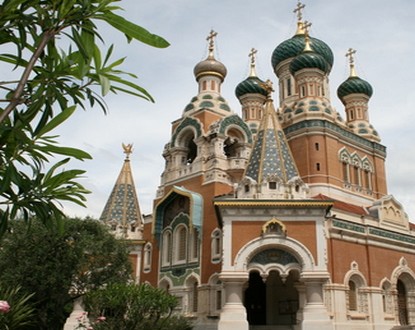:
Following our previous articles on the legal dispute it is engaged in with the Russian Federation, the ACOR Association, which manages the activities of the Russian Cathedral of Saint Nicholas, has sent us this statement.
During the visit by a delegation from the Russian presidential administration on July 9, 2011, to the ACOR administration, Mr. Kozhin, General Secretary of the Russian Federation’s Presidential Administration and head of the delegation, expressed a desire to establish peaceful relations, clearing away recent rumors and calumnies.
However, very quickly, anonymous and slanderous statements followed one another on various sites connected to the Moscow Patriarchate, in Russia and France. For this reason, the ACOR administration has decided to issue a new clarification, following the one from June 18, 2011.
Since the beginning of the dispute in 2006, the Russian Federation has conducted a systematic disinformation campaign alongside the judicial process, concerning the financial situation of ACOR (relayed by Russian media, including the internet, Moscow Patriarchate sites, their sympathizers, and occasionally picked up by local and national French media, and demonstrators at the Cathedral’s forecourt).
The figures presented were more than double the actual figures, always suggesting that ACOR refused to let go solely for financial reasons. The Federation’s lawyer has not hesitated to claim at an appeal hearing that “the entire affair began in 2006 because information reached the Russian Embassy that icons were starting to disappear” (stolen by ACOR members?): a defamatory lie highly prosecutable.
Several times, the ACOR administration has publicly refuted these falsehoods.
During the meeting on July 9 with the representative of the Russian presidential administration, Mr. Kozhin, in response to rector Fr. Jean Gueit’s question asking if he believed in the document publicly disseminated (notably on the ACOR support site and relayed by Nice-Matin on June 27, 2011), Kozhin responded with silence… evidently allowing the continuation of slanderous disinformation.
Thus, 4 days after the meeting, Mr. Khrekov, Mr. Kozhin’s press officer, declared: “The community currently managing the cathedral refuses to recognize Russia’s property rights because the cathedral is a source of income; by some estimates, entry rights generate about 1 million euros per year.” (Interfax-religion Pravoslavie.ru relayed by Parlons d’Orthodoxie)
“Revenues, …some estimates, …generate…”, this is indeed propaganda vocabulary intended to create confusion and discredit without any basis. ACOR’s budget, which averages 540,000 euros annually over 6 years, is an association budget that cannot generate profit, balancing revenues and expenses with an average positive balance of 2,000 euros/year. This budget, voted annually in the ACOR General Assembly, has always received unanimous approval.
It is supervised by an accounting firm and an auditor.
Mr. Kozhin’s press officer should visit them after getting acquainted with the vocabulary and management rules of a religious association in France.
This systematic harassment regarding the cathedral’s visitation rights further prompts us to clarify the following:
1) Many churches in Russia (notably those in the Kremlin, some in St. Petersburg, the Novodevichy Monastery, and others…) require paid visits outside of services like the Nice Cathedral. Closer to us, in Cannes, at the St. Archangel Michael church, which recently experienced considerable judicial tumult qualifying as criminal but whose renovation committee is chaired by the Moscow Patriarch, a photo exhibition was organized in June this year inside the church with a 5 euro entry fee; is this a “scandalous touristic business”?
2) Conversely, unlike the practice of St. Nicholas Cathedral in Nice, private religious services (“Treby”: baptisms, marriages, prayers for the deceased, and even, in accordance with Orthodox liturgical practice, the commemoration of the living and deceased during the Eucharist) are mostly paid in Russia, with fees apparently too high for the local population. Patriarch Alexis II himself has repeatedly denounced “undue phenomena in celebration practices, notably refusals to celebrate these ‘private services’ for insufficient ‘donations’ and emphasized ‘Under no circumstances should a rigid pricing be established for the celebration of sacraments or liturgical services’” (archives from the official Moscow Patriarchate site 1997-2009). Surely the situation has evolved little.
It may be assumed that removing visitation fees at the Nice cathedral would lead, as in Rome and elsewhere, to the pricing of private religious services. Would such pricing be less “scandalous” than touristic entry fees?


